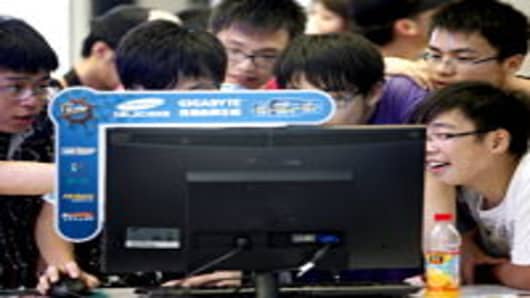Washington Post columnist Vivek Wadhwa made waves with his recent column "What we really need to fear about China". Basing his conclusions from frequent visits to China over the past six years, Wadhwa argues China's next generation, graduating from the country's universities are hungry, innovative and poised to compete with the best Silicon Valley minds.
Wadhwa points to people like Robert Hsiung and Kai-Fu Lee as examples of top talent ready to make world-changing innovation. Kai-Fu Lee is the former China head for Googlewho set up his own incubator in Beijing called Innovation Works. Robert Hsiung is an entrepreneur who started the now defunct mobile phone apps firm Foxfly.
Wadhwa overestimates the prowess of China yet underestimates problems facing the education system that prevents the rise of a truly innovative entrepreneurial class.
Hsiung and Lee have not attended Chinese universities, they went to Ivy League universities. Lee is Taiwanese who was raised in the United States, and Hsiung was raised in Hong Kong where he attended an American-style international school.
A closer examination also shows that many of the top Chinese entrepreneurs in the technology sector actually studied in America. The founders of Baidu and Sina for instance all studied there.
Over one million Chinese have studied abroad in the last 30 years, of whom only about 30 percent have returned to China, precisely because the country's higher education system is outdated and does not adequately prepare people to think analytically and creatively in a globalized business world.
Large class sizes, curricula based on rote memorization, and practically no room for electives are some of the obstacles in the way of creating the intellectual climate needed to breed independent and innovative thinkers. Unless China significantly changes its higher education system, true innovation will be hampered in the country. Sure, there will be great entrepreneurs that can grow businesses globally, or adapt to the local domestic market, but few will be able to develop technologies that will change the world.
Young Chinese Are Risk Averse
Wadhwa also makes the mistake of overestimating the drive of many young Chinese. He argues that they, unlike older generations, are risk takers and no longer want to work in stodgy old state-owned enterprises or multinational firms. He concludes they want to work in start-ups.
Research suggests otherwise. A decade ago, top Chinese graduates wanted to work for Western brands like P&G , Coca-Cola , and IBM . Today young graduates look for jobs in Chinese firms, but in only the big private enterprises like Netease , Shanda, and Ctripthat offer stability and hefty stock options as perks.
Last year my firm found in interviews with hundreds of students from leading universities that the most coveted jobs were in state-owned enterprises like China Mobile and the State Electric Grid where profits and pay packages are soaring and working hours nine to five. So where is their risk-taking appetite?
Spoiled by parents who lived through the Cultural Revolution, far too many young Chinese have been taught to take it easy, and bolt for greener pastures at the first sign of trouble. Many are unable to overcome criticism and face challenges head on.
As one senior executive of a management consulting firm told me, "As soon as we criticize them or have them work late hours, they quit, cry or sulk." That is why it is common for young Chinese to have five jobs in five years. Not only are they job-hopping to grab slight pay increases, they simply do not want to work hard to achieve.
If anything, it is the older generation, the people in the 40-55-age range who are the risk takers. They suffered during China's dark days and learned how to build companies with their own sweat. They have nothing to lose, so they risk everything. Chinese in their 20s have only known good times and seek security.
Some of the greatest business minds in the world are in China. However, many of them gravitate to sectors like real estate where profits are high and risks are relatively low. For them, there is so much low hanging fruit that they do not feel the need to be innovative.
As China's economy continues to mature, it will need more innovative minds. That is unlikely to happen anytime soon as long as the education system remains ossified and until more young workers get more grit like their parents.
Shaun Rein is the founder and managing director of the China Market Research Group (www.cmrconsulting.com.cn) a strategic market intelligence firm, and is based in Shanghai.
He is the author of the upcoming book “The End of Cheap China: Economic and Cultural Trends that will Disrupt the World” published by John Wiley & Sons in the U.S. He does not own shares in any company mentioned. Follow him on Twitter at @shaunrein.


